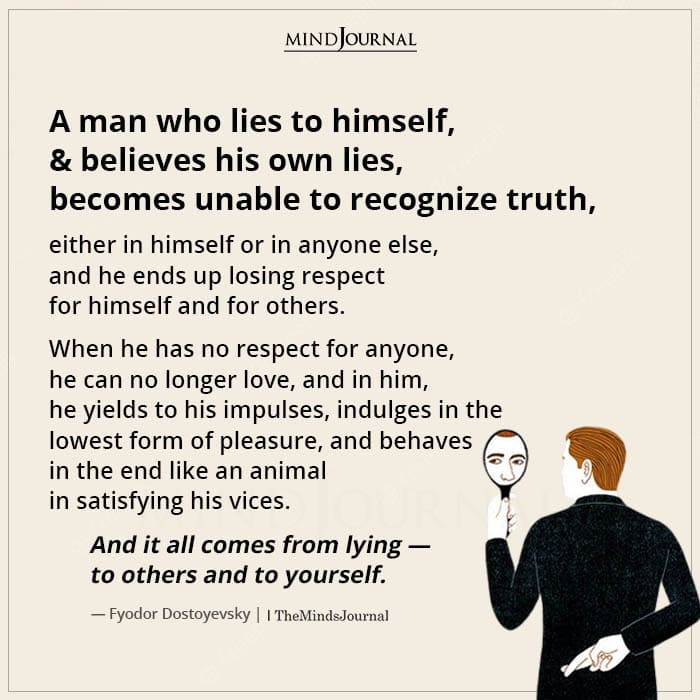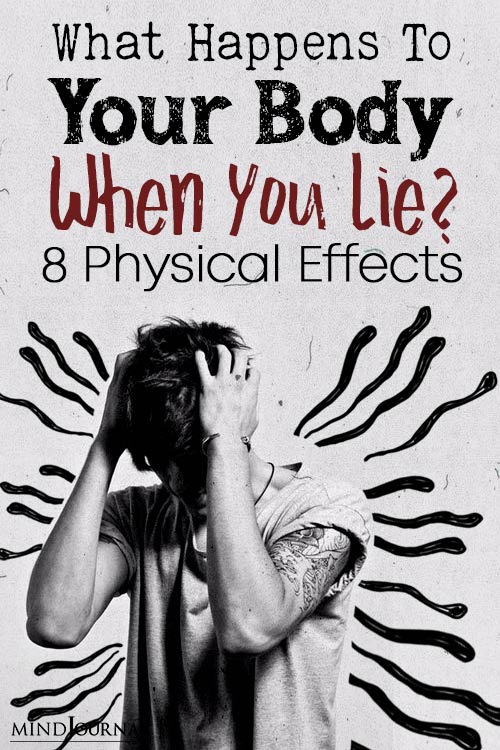We all tell white lies from time to time, but have you ever wondered about the physical effects of lying? Have you ever wondered what happens to our body when we lie? Lies, both big and small, seem harmless but the consequences of lying build up over time.
It turns out that fibbing can have more than just social consequences. The physical toll that lying takes on your body can be quite alarming.
Curious about what really happens in your body when you deceive others? Let’s take a deep dive into the surprising ways that lying affects our bodies.
What happens to your body when you lie
Do you know what are the consequences of lying? Lying can be tempting in certain situations. From little white lies to major deceptions, although lying may seem harmless, there are several negative consequences of lying on your body and wellbeing.

Related: The Science Of Lying: 9 Things You Should Know About Liars
Want to know about the bad effects of lying? Here is a list of consequences for lying that you should be aware of –
1. Increased heart rate and blood pressure
When you lie, your heart rate and blood pressure tend to increase as your body goes into “fight or flight” mode. This is due to the stress and anxiety that comes from trying to keep track of the details in your lie and worrying that you may get caught.
The physical effects of lying often include increases in your heart rate, blood pressure, and levels of cortisol, the body’s main stress hormone.
2. Increased stress
Lying causes a release of stress hormones like cortisol and adrenaline that activate the “fight or flight” response, even for “small” lies. These hormones increase heart rate, blood pressure and muscle tension which over time can lead to health issues.
3. Difficulty sleeping
Deception requires mental energy and concentration which can disrupt sleep and make it harder to fall asleep at night. The stress of keeping track of your lies also causes activation of the sympathetic nervous system which interferes with relaxation.
Studies show that people who lie more report lower sleep quality and satisfaction. Lying keeps you mentally active late into the night as you mull over your lies and their possible consequences.
The physical effects of lying often manifest in the form of difficulty falling asleep, staying asleep, and waking up feeling unrested.
Want to know about more negative effects of telling lies? Read on to understand what are the consequences of lying.
Related: Why Do Narcissists Lie So Much
4. Weakened immune system
Chronic lying and deception can weaken your immune system over time. When you lie regularly, elevated levels of stress hormones like cortisol become one of the negative effects of lying. This damages your immune system and makes you more susceptible to illnesses.
Studies have found that people who lie more often report more frequent colds, headaches, and stomach issues. By suppressing the immune system, chronic lying can also elevate stress hormones. This makes the body more vulnerable to illness and slows wound healing.
There are many more bad effects of lying that we need to understand when exploring the list of consequences for lying. Here are some more negative effects of lying.
5. Stomach issues
The anxiety that accompanies lying can manifest itself in physical effects of lying like diarrhea, stomach pain, nausea, vomiting, and heartburn. This is because lying triggers the release of cortisol in the body which puts your digestive system in overdrive.
Stress and anxiety provokes the fight or flight response which disrupts normal digestive function. It can also increase acidity and disrupt healthy bacteria in your gut, potentially leading to digestive issues.
Still wondering about the negative effects of telling lies? Here’s what happens to your body when you lie.
6. Muscle tension and headaches
Lying frequently can cause headaches and tightness in your jaw, neck, and shoulder muscles. You may find yourself clenching your jaw when you’re thinking of a lie or holding tension in your neck and shoulders.
The physical effects of lying causes muscle tension, which is the body’s reaction to stress. The body essentially stays in a state of “perpetual fight or flight“.
7. Changes in appetite
Appetite changes are one of the most common consequences of telling lies. Lying often causes changes in appetite, either increasing or decreasing it.
Some people may eat more due to feelings of guilt, stress, or anxiety associated with lying. Others may lose their appetite due to nausea from lying. The physical effects of lying on appetite are just one way that deception impacts your body on a physical level.
Related: How To Detect A Lie: 5 Simple Steps
8. Blushing and sweating
When telling a lie, it’s common to experience blushing, sweating, and other physical reactions as a result of increased anxiety. As the body gears up for the “fight or flight” response, blood flow increases which can cause blushing and flushing.
You may also experience excess sweating due to the release of stress hormones. These physical effects of lying can make it harder to get away with lying.
Apart from these, there can be many more negative psychological, emotional and physical consequences of telling lies. The physical effects of lying run deep and impact our body in numerous ways.
From increased heart rate and blood pressure to sleep issues and stomach problems, lying frequently exacts a toll on our physical and mental health.
While telling the occasional white lie may seem harmless, making a habit of lying can seriously degrade our health due to the physical effects of lying over time.
It’s always best to practice honesty and transparency with others to live a more authentic and healthy life by avoiding the consequences of lying.
Takeaway
Lying doesn’t just affect our relationships and reputations, it also has physical effects on our bodies. From increased stress levels to altered brain chemistry, our bodies pay a price when we’re not truthful.
By understanding the physical effects of lying, we can make more informed choices about when and how to be honest, ultimately leading to a healthier and happier life.
The next time an untruth seems tempting, remember the negative consequences of lying start to add up. Choose honesty instead – speak your truth, make amends if needed, and live lighter with less stress and better health.
Tell the truth and feel the relief of transparency – your body and wellbeing will thank you for it.
Related: Body Language: From Common Signs to Spotting Lies










Leave a Reply